
|
November 24, 2010 - No. 201 Justice for Migrant Workers Governments Must Defend Migrant Workers
|
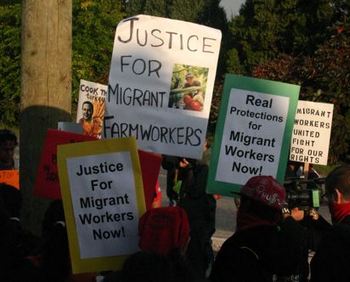 Pilgrimage to Freedom, October 10, 2010 |
Mohan Mishra, from No One Is Illegal and a member of CUPE, talked about the need for organized labour to assist in supporting the struggles of migrant workers who are part of the Canadian working class and to demand that these workers be granted landed immigrant status upon their arrival. In the spirit of "an injury to one is an injury to all" he called on the labour movement to put their collective strength behind the rights of migrant workers to refuse unsafe working conditions, for fair wages and for full status.
Following the main presentations, a lively discussion took place with many people contributing their own ideas and thoughts about working with migrant workers and those with no status in Canada. One of the main points brought out in the discussion was the courageous resistance of the migrant workers to the increasingly retrogressive and racist immigration and anti-worker policies of the Harper government and governments at all levels. They pledged to continue to mobilize and organize opposition to these brutal policies and demand that all migrant workers be granted status upon their arrival in Canada.
Discussion on Nation-Building
The Necessity to Restrict Monopoly Right
to Control and Manipulate Prices
Proposal
for
a
Modern
Formula
to
Determine
Prices of Production
TML is posting below Part Two of "Discussion on Nation Building -- The Necessity to Restrict Monopoly Right." Part One was published in TML Daily, November 23, 2010 - No. 200.
Part Two
Prices of Production and the Law of the Falling Rate of Profit
Key elements in determining market prices of commodities are their value according to the amount of work-time necessary to produce them and the rate of profit, both of which have a direct effect on prices of production around which market prices oscillate. Supply and demand of commodities act in concert with fluctuations in the rate of profit and prices of production responding to changes caused by the movement of capital into or out of a sector. Capital is constantly drawn or repelled by the going rate of profit and schemes for big scores.
Under nascent capitalism (19th century) especially, supply of certain commodities went up as the rate of profit rose above the average in a sector. Demand would not keep up with the excess supply of those commodities, which would drive down market prices reducing the rate of profit below average causing an exodus of capital or its destruction. This spontaneous phenomenon created a general rate of profit within the economy. With the constant application of science and technology to the production process, which culminates in higher productivity, the general rate of profit comes under pressure and tends to fall.
Under monopoly capitalism, supply and demand of most commodities, especially the basic ones and those that have been around a while are more firmly under monopoly control. For example, three monopolies control more than 70 per cent of the world's supply of iron ore -- Rio Tinto, Vale and BHP Billiton. If new sources are discovered, one of those three will be sure to pounce on it and make sure that the new source does not disrupt their monopoly control of iron ore supply. However, neither do they control demand nor the economic crises in other sectors and within the entire economy that their manipulation of iron ore prices helps cause. Similar monopoly control of real estate prices by the financial oligarchy recently caused house prices to rise well above their value provoking a crisis in the housing, construction and financial sectors in the U.S. that has spread into other sectors and around the globe generating a widespread economic crisis. The narrow egocentric outlook of the rich and their monopolies inevitably degenerates into wrecking and crisis, as the narrow interest of the particular monopoly clashes with the general interests of the modern integrated economy and society.
U.S. Dollar Hegemony
 Monopoly manipulation of prices
globally is an important
weapon in annexing sovereign nations and their economies within the
imperialist system of states dominated by the United States. Canada's
market prices for basic commodities, many of which are produced here in
large quantities such as nickel and copper, are generally dictated not
by prices of production set within Canada but by the global monopolies.
This problem is accentuated by the use of the U.S. dollar as means of
settlement in international trade rather than sovereign currencies or
bilateral barter. This aspect of using
the U.S. dollar as means of settlement introduces exchange rates among
currencies outside the trading relationship as a major problem, and the
serious issue of requiring U.S. dollars just to participate in
international trade. This obligation has given the U.S. dollar hegemony
in international trade and most financial
affairs, and access to almost unlimited financing to wage predatory
wars and to blockade and threaten sovereign countries that wish to
pursue an independent path or simply their right to be. The U.S. state
introduces dollars into international circulation without the necessity
of national production to back up the increased
amount. In this way, U.S. imperialism can run trade and fiscal deficits
as long as other countries continue to require and buy U.S. dollars.
This U.S. blackmail through currency hegemony forms part of monopoly
control of prices, particularly affecting major trading nations such as
Canada in a negative way. A Workers'
Opposition must force an end to this imperialist practice of U.S.
dollar hegemony and monopoly control of international trade. Canadians
have the sovereign public right and duty to control goods and capital
leaving and entering the country. They have the sovereign right and
duty to control and set the prices of goods
entering and leaving the country through bilateral arrangements with
trading partners. The U.S. imperialist state has no right to impose its
currency on the sovereign affairs of any nation and its international
trading relations, which should be based on mutual benefit and
cooperation not competition controlled by
monopolies.
Monopoly manipulation of prices
globally is an important
weapon in annexing sovereign nations and their economies within the
imperialist system of states dominated by the United States. Canada's
market prices for basic commodities, many of which are produced here in
large quantities such as nickel and copper, are generally dictated not
by prices of production set within Canada but by the global monopolies.
This problem is accentuated by the use of the U.S. dollar as means of
settlement in international trade rather than sovereign currencies or
bilateral barter. This aspect of using
the U.S. dollar as means of settlement introduces exchange rates among
currencies outside the trading relationship as a major problem, and the
serious issue of requiring U.S. dollars just to participate in
international trade. This obligation has given the U.S. dollar hegemony
in international trade and most financial
affairs, and access to almost unlimited financing to wage predatory
wars and to blockade and threaten sovereign countries that wish to
pursue an independent path or simply their right to be. The U.S. state
introduces dollars into international circulation without the necessity
of national production to back up the increased
amount. In this way, U.S. imperialism can run trade and fiscal deficits
as long as other countries continue to require and buy U.S. dollars.
This U.S. blackmail through currency hegemony forms part of monopoly
control of prices, particularly affecting major trading nations such as
Canada in a negative way. A Workers'
Opposition must force an end to this imperialist practice of U.S.
dollar hegemony and monopoly control of international trade. Canadians
have the sovereign public right and duty to control goods and capital
leaving and entering the country. They have the sovereign right and
duty to control and set the prices of goods
entering and leaving the country through bilateral arrangements with
trading partners. The U.S. imperialist state has no right to impose its
currency on the sovereign affairs of any nation and its international
trading relations, which should be based on mutual benefit and
cooperation not competition controlled by
monopolies.
Monopoly Attempts to Defy the Law of a Falling Rate of Profit
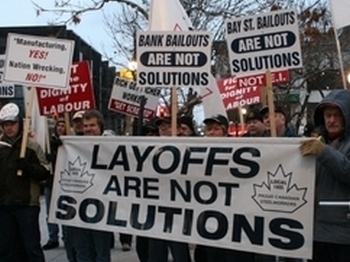 Specifically, control of
prices is a monopoly weapon to
ensure a certain rate of profit but defying an economic law is
destructive to other sectors and the economy as a whole. Controlling
prices for the narrow interests of a particular
monopoly or group of monopolies runs afoul with the law of a falling
rate of profit and prices of production determined in part by that law.
If the law is defied through price manipulation in one sector, a
spontaneous correction in prices will occur in other sectors causing a
crisis.
Specifically, control of
prices is a monopoly weapon to
ensure a certain rate of profit but defying an economic law is
destructive to other sectors and the economy as a whole. Controlling
prices for the narrow interests of a particular
monopoly or group of monopolies runs afoul with the law of a falling
rate of profit and prices of production determined in part by that law.
If the law is defied through price manipulation in one sector, a
spontaneous correction in prices will occur in other sectors causing a
crisis.
For monopolies, control of prices is one way to combat a tendency within the capitalist system for the rate of profit to fall as productivity improves. This economic law towards a falling rate of profit is generalized within the capitalist system. Monopolies try to counter this tendency by attacking workers and forcing them to reduce their claims on social product. Monopolies also use other means to defy this law such as manipulating prices and forcing them above the spontaneously set prices of production for their industry and enterprises.
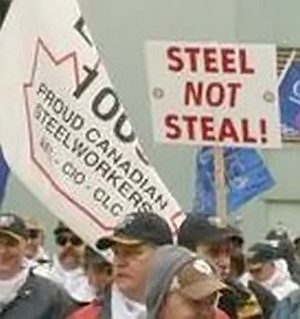 The problem posed for a Workers'
Opposition is to
restrict monopoly right and its attempts to reverse the tendency of a
falling rate of profit. A solution would be to restrict monopoly right
and let the rate of profit fall in a planned way for all enterprises.
This could be accomplished through government control
of the setting of prices of production by enforcing a general rate of
profit throughout the socialized economy that gradually falls as
productivity improves. This is in conformity with the natural
gravitation of the socialized economy away from capitalist profit
towards socialist profit claimed in trust by a government
of, for and by the people. This measure would allow the people to
benefit from increased productivity and its greater mass of social
product without suffering for it through economic crises and
destruction of produced values, which now occurs under the dictate of
monopoly right. The devastating wrecking of manufacturing
in recent years could be reversed by taking these and other measures to
restrict monopoly right.
The problem posed for a Workers'
Opposition is to
restrict monopoly right and its attempts to reverse the tendency of a
falling rate of profit. A solution would be to restrict monopoly right
and let the rate of profit fall in a planned way for all enterprises.
This could be accomplished through government control
of the setting of prices of production by enforcing a general rate of
profit throughout the socialized economy that gradually falls as
productivity improves. This is in conformity with the natural
gravitation of the socialized economy away from capitalist profit
towards socialist profit claimed in trust by a government
of, for and by the people. This measure would allow the people to
benefit from increased productivity and its greater mass of social
product without suffering for it through economic crises and
destruction of produced values, which now occurs under the dictate of
monopoly right. The devastating wrecking of manufacturing
in recent years could be reversed by taking these and other measures to
restrict monopoly right.
To accomplish this advance in Canada's political economy would entail taking measures to restrict monopoly right particularly within the wholesale sector and the setting of wholesale prices for both domestic production and distribution and international trade. This would mean giving government authority to set prices of production based on a modern formula, which includes a Canadian general rate of profit.
The Workers' Centre has researched this problem and has devised a proposal for a modern formula to set prices of production in the basic industries, which is presented in a subsequent part in this series of articles. The modern formula for prices of production and attendant restrictions on monopoly right in the wholesale sector, on capital movement and to stabilize the Canadian currency, financial enterprises and international trading relations would have a positive effect on mitigating the effects of economic crises however only new relations of production would eliminate the business cycle. A positive effect on nation-building would be pronounced within the basic industries, public services and the manufacturing sector bringing back some stability and growth to them, freeing up funds in the public sector for investment in Canadian manufacturing organized as worker cooperatives or public enterprises. Restricting monopoly right and building not-for-profit financial enterprises with a mandate to invest in Canada would allow workers and members of the middle strata to save and use those funds to invest with confidence in Canadian enterprises especially public enterprises and worker cooperatives of a sovereign self-reliant economy.
When implemented by determined class struggle of a Workers' Opposition, the restrictions on monopoly right would serve the public good and open a path for further advancements towards a People's Canada where the people are empowered and have control and decision-making power over their own destiny including their socialized economy.
Falling Rate of Profit
The tendency of a falling rate of profit or falling rate of return on invested capital is a feature of the capitalist stage of commodity production during the transition from petty production to mass industrial production. This tendency and the monopolies' damaging attempts to circumvent it for their own narrow ends point to the reality that the capitalist system is a transient one and cannot mobilize the full benefits of the higher level of the productive forces for the people within a harmonious economy without recurring economic crises.
 The monopolies' various
attempts to overcome the
tendency of a falling rate of profit signal the necessity for new
relations of production that can fully utilize the benefits of mass
industrial production under the banner of humanizing the social and
natural environments. The tendency of a falling rate of profit
is a spontaneous sign that mass industrial production demands a new aim
and harmony between the forces of socialized production and the
relations of production. The forces of production are fully socialized
and demand cooperation among its many sectors and enterprises yet the
relations of production lag behind
in private ownership captured within narrow aims governed by egocentric
greed and destructive competition. The actual producers, the working
class and its allies, must gain control and decision-making over the
direction of the economy and harmonize the socialized force of
production with socialized relations of
production.
The monopolies' various
attempts to overcome the
tendency of a falling rate of profit signal the necessity for new
relations of production that can fully utilize the benefits of mass
industrial production under the banner of humanizing the social and
natural environments. The tendency of a falling rate of profit
is a spontaneous sign that mass industrial production demands a new aim
and harmony between the forces of socialized production and the
relations of production. The forces of production are fully socialized
and demand cooperation among its many sectors and enterprises yet the
relations of production lag behind
in private ownership captured within narrow aims governed by egocentric
greed and destructive competition. The actual producers, the working
class and its allies, must gain control and decision-making over the
direction of the economy and harmonize the socialized force of
production with socialized relations of
production.
Beside the monopolies' attempts to stem the fall in the rate of profit and the disruption this causes, another issue that varies greatly from the time of nascent capitalism is the enormous claim of government and its effect on prices of production and the added downward pressure those claims put on the rate of profit. The claims of government on social product and the constant need for increased investment in social programs, public services and public enterprise within a sovereign self-reliant economy are accounted for in the proposed formula. Class struggle between the working class and monopolies over renewal of the taxation system away from individual taxation towards taxation on enterprises at the point of production is discussed in Part Four of this series. Such a change would also assist in retaining more value within the Canadian economy for its extended reproduction and would strengthen the public sector in opposition to a private sector under monopoly control.
The Workers' Centre believes discussion on these issues of rate of profit and prices of production is vital for the working class in formulating its program for nation-building and creation of a People's Canada. This discussion touches on the front of public control of the wholesale sector and prices, reform of the tax system, public control of capital flowing out of and into Canada, the need for public control over imports and exports and disengagement from U.S. dollar hegemony, the necessity to stabilize Canada's currency internally and in relation to other currencies especially by implementing reform of international trade and its settlement, and the need for public not-for-profit financial enterprises.
Implementing any part of a program for nation-building towards a People's Canada requires restricting monopoly right. The only way to restrict monopoly right is through mass political mobilization of the working class and its allies to assert their political power through empowerment and control of the state machine. This is a matter of class struggle, which essentially means that it is up to the working class to organize itself into a powerful Workers' Opposition, as a class of, for and by itself. No individual saviours or other social force will do it for the working class nor does any individual or other social force have the actual and potential strength to challenge monopoly right without mass political mobilization of the working class.
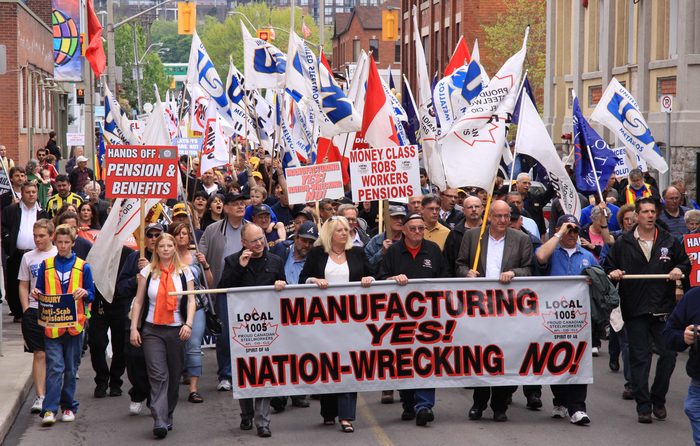 In the modern era, the
working class itself must
consciously organize its class struggle to move society forward from
capitalism to socialism otherwise, the contradictions inherent within
capitalism may destroy humanity. Nothing will change fundamentally
without conscious class struggle of the working class
negating its negation. Not a few are desperate to find another social
force or means that can implement reforms here and there to save
humanity from the disasters imperialism has in store for the people but
no other social force but the proletariat and its conscious class
struggle can save the day.
In the modern era, the
working class itself must
consciously organize its class struggle to move society forward from
capitalism to socialism otherwise, the contradictions inherent within
capitalism may destroy humanity. Nothing will change fundamentally
without conscious class struggle of the working class
negating its negation. Not a few are desperate to find another social
force or means that can implement reforms here and there to save
humanity from the disasters imperialism has in store for the people but
no other social force but the proletariat and its conscious class
struggle can save the day.
***
The law of the falling rate of profit defined by Karl Marx:
"The progressive tendency of the general rate of profit to fall is, therefore, just an expression peculiar to the capitalist mode of production of the progressive development of the social productivity of labour. This does not mean to say that the rate of profit may not fall temporarily for other reasons. But proceeding from the nature of the capitalist mode of production, it is thereby proved a logical necessity that in its development the general average rate of surplus-value must express itself in a falling general rate of profit. Since the mass of the employed living labour is continually on the decline as compared to the mass of materialized labour set in motion by it, i.e., to the productively consumed means of production, it follows that the portion of living labour, unpaid and congealed in surplus-value, must also be continually on the decrease compared to the amount of value represented by the invested total capital. Since the ratio of the mass of surplus-value to the value of the invested total capital forms the rate of profit, this rate must constantly fall." -- Capital, Volume III, Part III: The Law of the Tendency of the Rate of Profit to Fall, Chapter 13 -- The Law as Such
(Part Three: How the Problem of Prices of Production Poses Itself)
Korea
Korean People's Army Vows to Defend
Territorial Integrity of the DPRK
 On November 23, the Supreme Command of the
Korean
People's Army
(KPA) issued a communiqué denouncing the south Korean U.S.
puppet
regime for its "reckless military provocation" of firing dozens of
artillery shells inside DPRK territorial waters around Yeonpyeong Islet
in the West Sea. In its communiqué,
the KPA Supreme Command condemned the war preparations and military
exercises codenamed "Hoguk" that the U.S. and south Korean military are
carrying out around Yeonpyeong Islet as an act of aggression
against the DPRK and an escalation of tensions on the Korean peninsula.
On November 23, the Supreme Command of the
Korean
People's Army
(KPA) issued a communiqué denouncing the south Korean U.S.
puppet
regime for its "reckless military provocation" of firing dozens of
artillery shells inside DPRK territorial waters around Yeonpyeong Islet
in the West Sea. In its communiqué,
the KPA Supreme Command condemned the war preparations and military
exercises codenamed "Hoguk" that the U.S. and south Korean military are
carrying out around Yeonpyeong Islet as an act of aggression
against the DPRK and an escalation of tensions on the Korean peninsula.
The communiqué also noted that the military provocation carried out by south Korea on November 23 was "a sinister attempt to defend the 'Northern Limit Line'" and that south Korean naval vessels have often entered into DPRK territorial waters under the pretext of "intercepting fishing boats" from the north.
The KPA Supreme Command stated that in light of the most recent military provocations from the south, the "revolutionary armed forces of the DPRK standing guard over the inviolable territorial waters of the country" responded with a "prompt powerful physical strike" and unequivocally affirmed that "should the south Korean puppet group dare intrude into the territorial waters of the DPRK even 0.001 mm, the revolutionary armed forces of the DPRK will unhesitatingly continue taking merciless military counter-actions against it." The KPA Supreme Command underscored that it does not make idle threats.
The communiqué ends by reiterating that the DPRK does not accept the "Northern Limit Line" as the maritime demarcation line in the West Sea of Korea and that south Korea best take note of that.
Provocative U.S.-South Korean
Military Exercise in West Sea
A U.S.-south Korean joint military exercise is taking place in disputed waters in close proximity to the Democratic Republic of Korea (DPRK). This provocative activity involves more than 70,000 troops and includes live-fire drills in waters off Bangnyeong and Yeonpyeong islands as part of south Korea's annual nine-day "Hoguk" (Protecting the Nation) exercise. The DPRK has long opposed such exercises, which are often conducted in conjunction with the U.S., as being counterproductive toward peaceful relations between the two Koreas.
Early on Tuesday morning, the DPRK sent a message to the south requesting it stop military drills in the area. South Korea refused and underscored its obstinance by firing artillery into the disputed waters.
Monopoly media in Canada and elsewhere reported the events as an unprovoked attack on south Korean positions on the island of Yeonpyeong, part of a cluster of small islands near the DPRK coast on the West Sea. What can be discerned from these reports is that, having instigated the incident, south Korean forces returned fire and in the ensuing hour-long artillery exchange, two south Korean marines and two civilians were killed and sixteen others injured.
The U.S. and its retrogressive puppet Lee Myung Bak regime in the south lost no time in misrepresenting the events as an act of aggression by the DPRK.
The disinformation about this latest attempt to
spuriously
attribute blame to the DPRK is directly related to another piece of
disinformation, namely the so-called Northern Limit Line (NLL), a
maritime border that the U.S. and south Korea wish to impose on the
DPRK so as to undermine its sovereignty.
The Northern Limit Line was declared unilaterally by the Commander of
the United Nations Command in August 1953 after the matter could not be
settled within the bounds of the Korean Armistice Agreement signed in
July 1953 which established the terrestrial Demarcation Line (DML)
which bisects the Korean
peninsula. The DPRK does not recognize the NLL and has proposed many
times simply extending the DML straight out into the West Sea while at
the same time making provisions for south Korea to access its islands
in the area through two designated waterways.
The fact is that south Korea, as it has done so many times before, with the full support of the U.S., carried out this latest military exercise knowing very well that it was close to or on DPRK territory. It is also noteworthy, that after the DPRK fired its artillery shells in response to the first south Korean salvo, some 18 minutes went by before the south Korean side fired again. According to various south Korean media, the reason for this was to check "first with higher authorities" -- i.e. U.S. military command in south Korea.
Following their unsuccessful attempts to isolate the DPRK and blame it for the Cheonan incident using a spurious report this past spring, the U.S. and its puppet regime in the south threatened intensified war games, much to the concern of not only the DPRK but other countries in the region. These war exercises are in violation of the terms of the Korean Armistice Agreement, all north-south agreements, as well as the statements of the Six Party Talks to denuclearize the Korean peninsula because they do nothing to "normalize relations" with the DPRK as stipulated in these agreements. They are but one provocation after another, destabilizing the Korean peninsula and bringing the Korean peninsula closer to the brink of another disastrous Korean War or even a nuclear holocaust. It is within this dangerous situation created by the U.S. imperialists and reactionary forces in south Korea that the DPRK has been forced to reply with deadly force to try and forestall even greater provocations.
All peace and justice loving Canadians and people
around the world
must hold the U.S. and its puppet regime in south Korea responsible for
instigating these incidents that pose grave dangers of a catastrophic
nuclear war that will embroil the whole world.
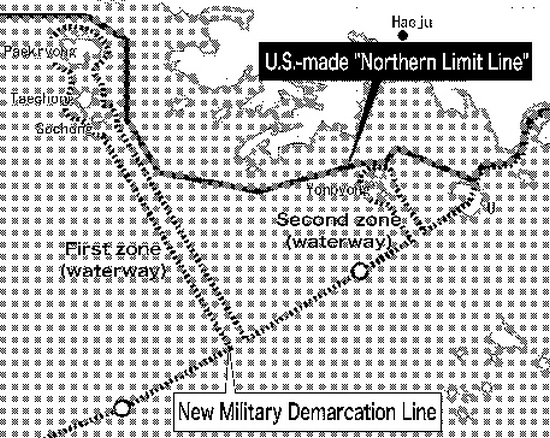
The New Military Demarcation Line (MDL) proposed by the DPRK in 1999 is an extension of the MDL designated by the 1953 Korean Armistice Agreement. It was drawn on the principle of equidistance from the projected parts of lands of both sides -- the southernmost islets under the DPRK's control and the northernmost islets under south Korean control. The first and second zones (waterways, about 3 km wide) were set for U.S./south Korean vessels to navigate along, in consideration of the fact that the five islands (Paekryong, Taechong, Sochong, Yeonpyeong and U islets) are under south Korean control. Yeonpyeong Islet, site of the recent exchange of fire is accessible via the second zone. (KCNA)
Down With Stephen Harper's Provocations and Warmongering Against the DPRK!
TML resolutely condemns the provocative and war-mongering statement that Prime Minister Stephen Harper made on November 23 in relation to the Democratic People's Republic of Korea and the artillery exchange that took place between the north and south around Yeonpyong islet.
Far from Canada being "committed to peace and stability on the Korean peninsula" as Harper purports, the statement is extremely provocative and incites the UN to condemn the DPRK and enforce more sanctions against that country, while conveniently exonerating the U.S. and its reactionary south Korean puppet regime for being the architects of all the provocations against the DPRK and all the tragedies that have befallen the Korean people since the end of the Second World War. The Prime Minister's remarks reference the Korean Armistice Agreement but only insofar as to misrepresent its spirit and content and create prejudice against the DPRK. His outrageous statement also covers up basic facts about the events that have unfolded on the Korean peninsula, also to create anti-DPRK hysteria.
The Prime Minister's statement evades Canada's responsibility for its participation as a bellicose outside force in the Korean civil war, ultimately contributing to the continued division of Korea. Furthermore, his remarks actually fan the flames for another tragic Korean war in which Canada will be embroiled because according to the Prime Minster "Canada is a vigorous defender of freedom, democracy, human rights and the rule of law around the world." This is the same self-serving line given to justify Canada's participation in the invasion of Afghanistan almost ten years ago.
The people of the DPRK emancipated themselves from foreign subjugation and established and defended their nation precisely to defend against the imposition by force of so-called western values that Harper and the U.S. imperialists promote. The Korean people, led by the leadership and armed forces which built the DPRK, were the ones who settled scores with imperialism and colonialism and contributed with their blood to the defeat of imperial Japan during the Second World War and made an outstanding contribution to the defeat of the Axis powers and helped the world's people secure peace. Stephen Harper should have the humility to recognize at least this much.
Canadians must denounce Stephen Harper's latest provocations and warmongering against the DPRK on the basis of imperialist disinformation about the tragic events on Yeonpyong islet. They must oppose all sanctions imposed as a result of the so-called "controlled-engagement" adopted by the Canadian government against the DPRK and move immediately to normalize diplomatic, trade and other relations with the DPRK. This would be a real contribution to peace and stability in the Korean peninsula.
No to the Harper Government's
Provocations and
Warmongering Against the DPRK!
Withdraw All Sanctions Against the DPRK!
Normalize Diplomatic Relations with the DPRK Immediately!
Read The Marxist-Leninist
Daily
Website: www.cpcml.ca
Email: editor@cpcml.ca
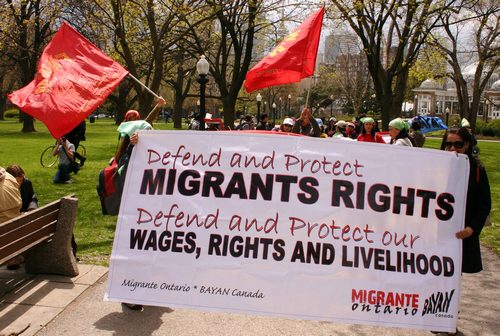
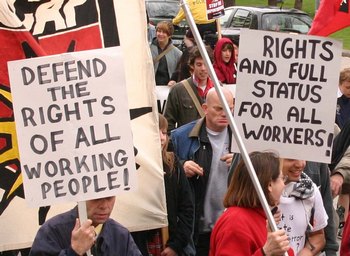

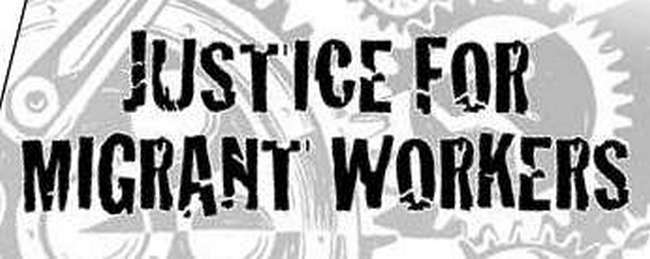 (Simcoe, Ontario)
Over 100 migrant farm workers
employed at Ghesquiere Plants Ltd. are facing imminent repatriation
(deportation) after staging a wildcat strike to demand thousands of
dollars in unpaid wages.
(Simcoe, Ontario)
Over 100 migrant farm workers
employed at Ghesquiere Plants Ltd. are facing imminent repatriation
(deportation) after staging a wildcat strike to demand thousands of
dollars in unpaid wages.